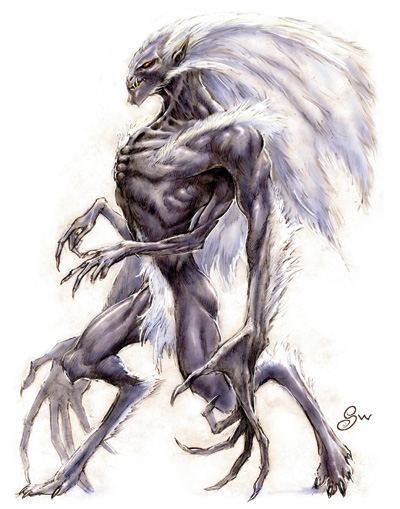|

|
The Wendigo (also known as Windigo, Weendigo,
Windago, Windiga, Witiko, Wihtikow, and numerous
other variants) is a mythical
creature appearing in the mythology of the Algonquian
people. It is a malevolent cannibalistic spirit into which humans could
transform, or which could possess humans. Those who indulged in
cannibalism were at particular risk, and the
legend appears to have reinforced this practice as taboo.
The Wendigo is part of the traditional belief systems of various Algonquian-speaking tribes in the northern
United States and Canada, most notably the Ojibwa/Saulteaux, the Cree, and the Innu/Naskapi/Montagnais.[4]
Though descriptions varied somewhat, common to all these cultures was the
conception of Wendigos as malevolent, cannibalistic, supernatural beings (manitous) of great spiritual power.[5]
They were strongly associated with the Winter, the North, and coldness, as well
as with famine and starvation.[6] Basil Johnston, an Ojibwa teacher and
scholar from Ontario, gives one
description of how Wendigos were viewed:[7]
At the same time, Wendigos were embodiments of gluttony, greed, and excess;
never satisfied after killing and consuming one person, they were constantly
searching for new victims. In some traditions, humans who became overpowered by
greed could turn into Wendigos; the Wendigo myth thus served as a method of
encouraging cooperation and moderation.
Among the Ojibwa, Eastern Cree, Westmain Swampy Cree, and
Innu/Naskapi/Montagnais, Wendigos were said to be giants, many times larger than
human beings (a characteristic absent from the Wendigo myth in the other
Algonquian cultures). Whenever a Wendigo
ate another person, it would grow larger, in proportion to the meal it had just
eaten, so that it could never be full. Wendigos were
therefore simultaneously constantly gorging themselves and emaciated from
starvation.
All cultures in which the Wendigo myth appeared shared the belief that human
beings could turn into Wendigos if they ever resorted to cannibalism or,
alternately, become possessed by the demonic spirit of a Wendigo, often in a
dream. Once transformed, a person would become violent and obsessed with eating
human flesh. The most frequent cause of transformation into a Wendigo was if a
person had resorted to cannibalism, consuming the body of another human in order
to keep from starving to death during a time of extreme hardship or famine.
Among northern Algonquian cultures, cannibalism, even to save one's own life,
was viewed as a serious taboo; the proper
response to famine was suicide or
resignation to death. On one level, the
Wendigo myth thus worked as a deterrent and a warning against resorting to
cannibalism; those who did would become Wendigo monsters themselves.
|
 Copyright(c) 2007
- 2020. All rights reserved. Copyright(c) 2007
- 2020. All rights reserved.
|

![]() Copyright(c) 2007
- 2020. All rights reserved.
Copyright(c) 2007
- 2020. All rights reserved.